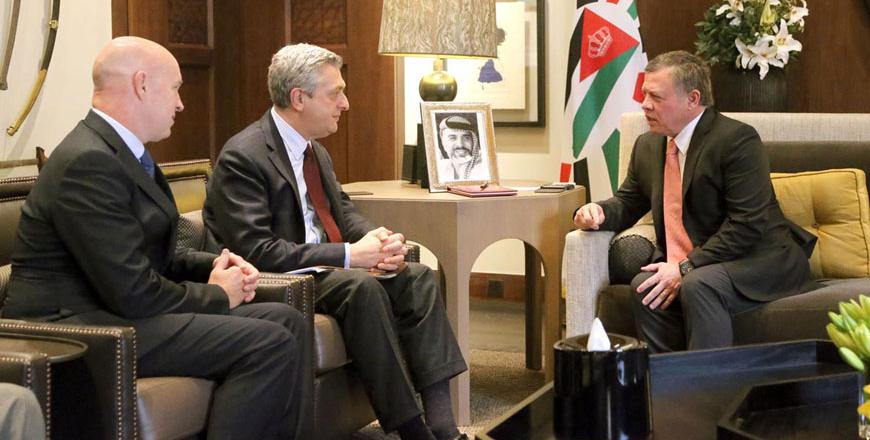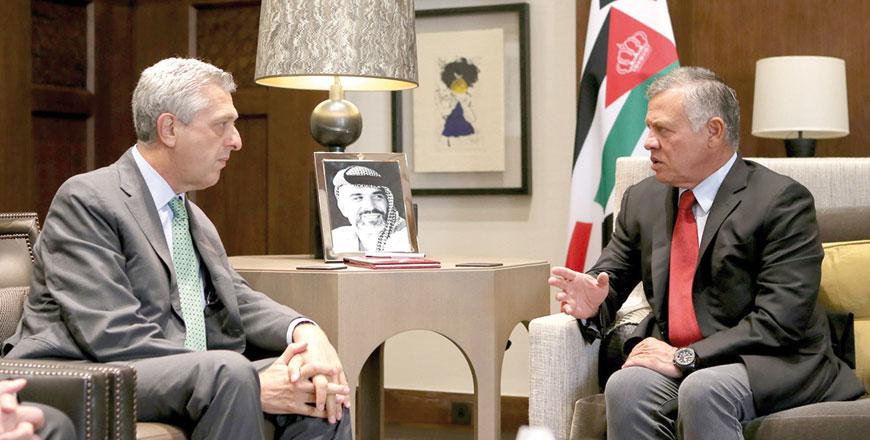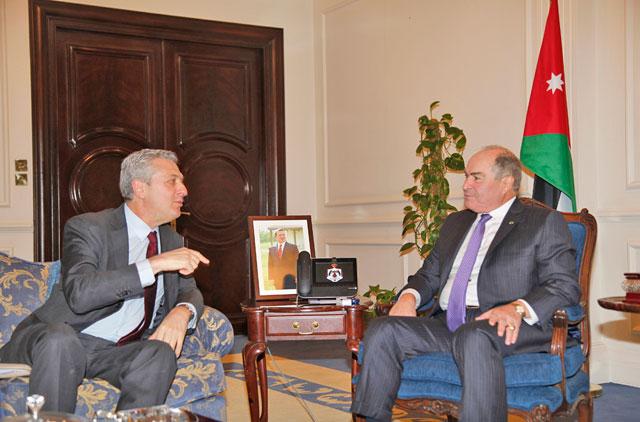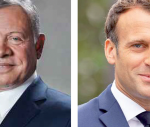You are here
UNHCR ‘understands Jordan’s security concerns’ — new chief
By Khetam Malkawi - Jan 18,2016 - Last updated at Jan 18,2016
MAFRAQ — Ending the conflict in Syria is the solution needed to end the refugee crisis, historically the largest the international community has been dealing with, a senior UN official said on Monday.
There is a “need for a quick solution to the conflict which is the principal cause for the crisis in Syria”, said UN High Commissioner for Refugees Filippo Grandi, warning that until that happens, “we need greater resources to refugees and countries hosting them”.
Grandi, who visited Jordan as part of a regional tour to countries affected by the Syrian crisis, said unfortunately the persistence of the conflict in Syria means that the crisis continues to affect millions of Syrians, countries neighbouring Syria and host communities.
At a press conference in the Zaatari Refugee Camp, 80km northeast of Amman, the UN commissioner said after five years of war in Syria, the fragility and vulnerability of both refugees and host communities are increasing.
“So we are at a difficult stage of emergency… and we believe we have to continue to maintain the affection of the international community … to get enough support to address the consequences of the crisis.”
He stressed the importance of engaging all influential countries to exercise greater efforts for peace and to end conflict.
“If fighting does not stop, this crisis will not end and we will continue year after year asking the international community for huge money, until there is peace.”
To alleviate the burden on countries hosting refugees, Grandi said the UN agency will organise a conference in Geneva at the end of March to ask states to pledge not only money, but places to relocate Syrians who are in host countries, including Jordan.
“We are talking about large numbers”, tens of thousands, and “we need to discuss this with states”, he told reporters, adding that what is needed is a better sharing of responsibilities internationally, for a crisis that is not only to be shared by countries neighbouring Syria.
“It has to be shared globally and in an orderly way,” Grandi said, explaining that focusing on legal pathways is a means to prevent illegal entry into these countries.
However, what would be difficult in the resettlement proposal is that many people are arriving already to these countries through illegal means, smuggling and trafficking channels, according to the UN commissioner, who noted that so many countries are saying: “We are already receiving these people, so why should we take in more people through legal means?”
In 2015, the number of resettlements, pledged by the US, Canada and the EU countries was more than 25,000. The programme has already started and is progressing, said the UNHCR chief, adding that the agency hopes the same number of places will be available in 2016.
As for the Syrian refugees who are camping across the border with Syria, Filippo said their number now is 17,000 (Jordan says 12,000), and the agency understands Jordan’s security concerns regarding allowing their entry.
“We have full appreciation and understanding of Jordan’s security concerns.” However, “because the war in Syria is so complex, vicious and includes terror, the issue of refugees continues to mingle with the security issue”.
Once those security concerns are satisfied, and it is certain that there are no elements of danger, then “they should be progressively admitted into Jordan’s territory”.
Meanwhile, Andrew Harper, the UNHCR representative to Jordan, said the agency needs $300 million to provide services for the Syrian refugees in 2016. He told The Jordan Times that Jordan’s approximate overall need to deal with the refugees this year is $3 billion.
Related Articles
AMMAN — His Majesty King Abdullah on Monday called for further cooperation between the Kingdom and UNHCR, to ensure that the international c
AMMAN — His Majesty King Abdullah on Monday met with UN High Commissioner for Refugees (UNHCR) Filippo Grandi over means of cooperation betw
AMMAN — Prime Minister Hani Mulki on Tuesday and UN High Commissioner for Refugees Filippo Grandi discussed means of cooperation between the



















